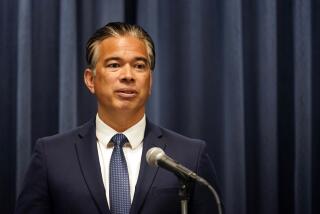Lt. Gov. Gavin Newsom alleges ‘threats’ against mortgage plan
California Lt. Gov. Gavin Newsom accused the mortgage industry, Wall Street and a major federal regulator of colluding to pressure local governments into rejecting a controversial proposal to seize mortgages and restructure them.
Newsom on Monday sent a letter to the Department of Justice asking for an investigation into statements by some groups representing Wall Street investors and the mortgage industry that mortgage lending may become costlier in parts of the country where municipalities are weighing eminent domain proposals. San Bernardino County is in effect ground zero for the debate on using the legal maneuver to help underwater homeowners.
“I am most disturbed by the threats leveled by the mortgage industry and some in the federal government who have coercively urged local governments to reject consideration of any proposal that would exercise the powers constitutionally granted local governments to use eminent domain,” Newsom wrote in his letter, which was addressed to the Justice Department’s antitrust division.
The Justice Department said it had not yet received the letter, but that it would be reviewed.
Newsom’s complaint comes after several groups, including the influential Securities Industry and Financial Markets Assn., objected to the eminent domain plan and warned that mortgages could become more expensive for future homeowners living in regions that adopt the plan.
The Federal Housing Finance Agency, the independent government regulator that oversees mortgage titans Fannie Mae and Freddie Mac, also expressed worry about the plan. The agency last month said it has “significant concerns about the use of eminent domain to revise existing financial contracts” and that it “has determined that action may be necessary.”
The housing agency also asked for public comment, and last week investor groups both opposed and in favor of the eminent domain plan filed letters to the agency laying out their arguments.
The involvement of the federal housing agency escalates the stakes of the battle because Fannie and Freddie control such an enormous portion of the mortgage market. Further, the agency’s acting director, Edward J. DeMarco, opposes moves to reduce the principal on mortgages owned or backed by the mortgage giants.
If Fannie and Freddie were to restrict credit to areas that adopted the eminent domain proposal, it could “stop the program immediately,” Amherst Securities analyst Laurie Goodman said in a recent report. She noted that Fannie and Freddie together hold about $112.9 billion worth of “private label securities,” those pooled into trusts by Wall Street during the housing boom and sold as securities to investors such as public pension plans, 401(k) plans and individual investors.
San Bernardino County is widely considered to be the local government furthest along in considering the proposal. The county was the first approached by Mortgage Resolution Partners, the San Francisco-based investment group promulgating the idea. The investment group came to San Bernardino County because of its size and the large number of “underwater mortgages,” loans in which the homes wouldn’t sell for enough money to pay off the debt on the properties.
The eminent domain idea has spread to numerous other jurisdictions ever since San Bernardino County, in partnership with the cities of Ontario and Fontana, formed a Joint Powers Authority to consider the proposal. The cities of Elk Grove and Sacramento are considering similar proposals. The city of Berkeley is also interested, as is Suffolk County in New York. Last month, the Chicago City Council held a hearing on the idea, with Mayor Rahm Emanuel speaking out against it and actor John Cusack attending in support.
The plan calls for local governments to seize and restructure mortgages in private-label securitization trusts. Those mortgages have been particularly troubling to deal with during the housing crisis because often those loans can’t be modified, or sold at market value, because of the complicated contracts governing them.
The eminent domain idea has rankled Wall Street like few other proposals addressing the housing crisis. During a public hearing in San Bernardino, Tim Cameron of the Securities Industry and Financial Markets Assn. warned that moving forward with an eminent domain plan would lead to lengthy litigation.
SIFMA and 25 other financial trade associations reiterated their concerns last week in their letter to the federal housing agency, saying using eminent domain was unconstitutional and arguing that the program would have “chilling effects” on the extension of mortgage credit to those areas. The group has also expressed concerns that the original plan targeted only those mortgages whose borrowers were current on their payments.
In response, Mortgage Resolution Partners, in its own letter to the federal housing agency, said that it would expand its proposal to include all mortgages in private-label securitization trusts, including those where the borrowers are current, delinquent or in default. The group said that this expansion of the program could help as many as 15,000 households in the areas in San Bernardino County that are currently considering the plan, and 45,000 families if more cities in the county sign on.
The group also said that “any actions by Fannie Mae or Freddie Mac … to retaliate against these jurisdictions (as suggested by certain Wall Street special interest groups) would create significant liability for geographic redlining and must be avoided.”
Newsom, in his letter to the Justice Department, framed the issue as one with civil rights overtones.
“San Bernardino County, which is furthest along in considering the use of eminent domain, has a predominantly minority population that suffered a disproportionate amount of subprime loan origination during the bubble,” he wrote. “Limiting credit there because the local government acts to acquire and refinance these homeowners’ loans is geographic redlining.”
Newsom appears to be the highest-ranking California politician to speak out on the plan under consideration by the Southland communities. The former mayor of San Francisco has some ties to Mortgage Resolution Partners. One of that company’s consultants, Peter Ragone, served as a spokesman for Newsom when the lieutenant governor was mayor.






